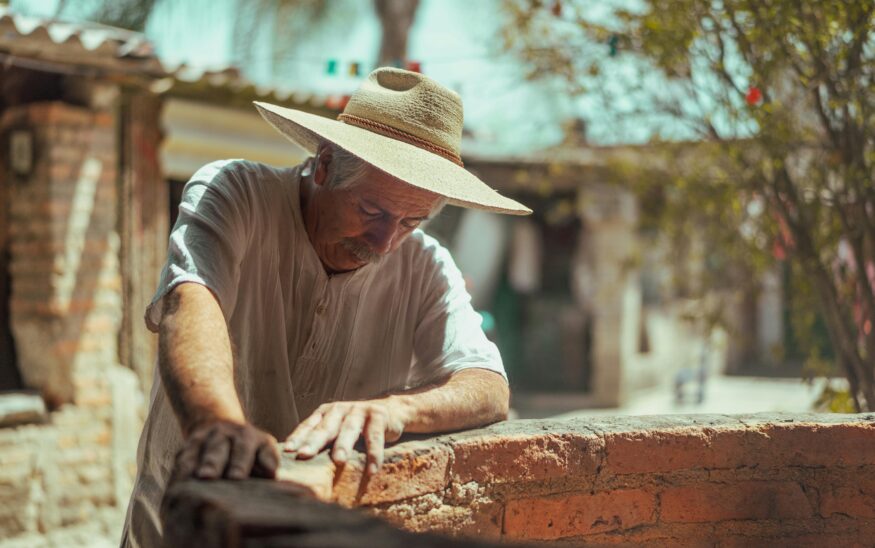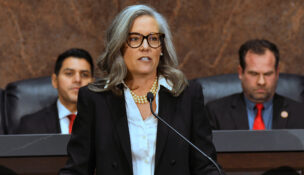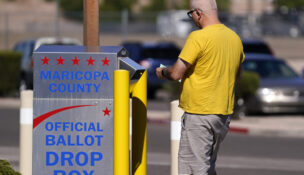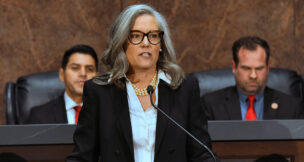Lawmakers bicker with Hobbs over groundwater supply
Reagan Priest Arizona Capitol Times//April 26, 2025//
Lawmakers bicker with Hobbs over groundwater supply
Reagan Priest Arizona Capitol Times//April 26, 2025//
Key Points
-
Republican lawmakers say they don’t know how much groundwater Arizona has
-
The governor and Department of Water Resources disagree with that assertion
-
Water policy experts worry about recent attacks on ADWR and its data collection
How much groundwater does Arizona have? The answer you get could depend on who you ask.
Lawmakers, stakeholders and water advocates are beginning to squabble over how much groundwater remains in the state and are already unable to agree on how to replenish or protect it.
In recent months, Republican lawmakers and conservative groups have resisted claims from Gov. Katie Hobbs and the Arizona Department of Water Resources about the state’s groundwater supply. In December, three Republicans in the Legislature sent a letter to ADWR asking simply, “how much water do we have?”
In a press release sent in March after ADWR responded to the Legislature’s letter, Rep. Gail Griffin, R-Hereford, said the response was not comprehensive enough and argued that “lawmakers are not receiving a clear picture” of groundwater in rural basins. Griffin, who represents a largely rural district in the state, said the response was not comprehensive enough.
“What good is a water budget if we don’t know how much is in our bank account?” Griffin said in a statement released in March. A spokesperson for the Arizona House Republican caucus did not respond to a request for comment on Griffin’s behalf.
The Goldwater Institute and the Home Builders Association of Central Arizona went so far as to accuse Hobbs and ADWR of manufacturing a crisis, saying the Hobbs administration’s water policy agenda is predicated on a “deeply inaccurate and flawed claim that Arizona is running out of water.”
The two entities filed lawsuits against ADWR earlier this year, arguing that the department’s rules regarding assured water supplies for residential developments were implemented illegally and are contributing to the housing shortage in the Phoenix area.
Hobbs and ADWR have firmly denied the claims made by Goldwater and the HBACA and also disagree with the recent characterization of the state’s water situation by lawmakers like Griffin.
“We have hydrogeological experts at ADWR that are doing this work, and I don’t see any of those experts in the Legislature,” Hobbs said during a press conference on April 22.
One water policy expert says bickering over the state’s water supply does not change the fact that it is being used up faster than it can be replenished.
“The question really isn’t, are we running out of groundwater? I think the question is, are we protecting this finite resource for a sustainable future?” said Kathleen Ferris, one of the architects of the 1980 Groundwater Management Act and a former ADWR director.
Ferris said determining groundwater levels requires money, time and staffing which ADWR has not always been well equipped to provide.
“If people think that they need more data from the department then they need to fund the department so that the department has the staff in order to develop that data,” Ferris said.
In January, Hobbs announced that ADWR would receive $5.5 million in federal funds for hydrogeologic studies that would help the state better understand its groundwater situation. Griffin introduced a bill this session to require the department to provide more data in its periodic supply-and-demand assessments of each groundwater basin in the state but did not attach a funding mechanism to the legislation.
Hobbs vetoed the bill on April 18, calling it and other groundwater bills from Griffin “political cover” for the Legislature’s failure to take meaningful action on rural water usage.
“We are currently negotiating an alternative framework for rural groundwater management, and I will not entertain any rural groundwater legislation that is outside the context of those negotiations,” Hobbs wrote in her veto letter.
She told reporters at a press conference on April 22 that she is looking for comprehensive legislation similar to the original Groundwater Management Act, which took three years to negotiate.
“The bills that I vetoed … didn’t do anything meaningful,” Hobbs said. “They weren’t going to solve the problems of homeowners or farmers in Wilcox. And we’re committed to staying at the table. We’re in year two. Let’s continue to work to get it done.”
With groundwater conversations already fractious and often unproductive, Ferris said she is worried that disputes over the details could derail much needed reform efforts.
“I haven’t seen this kind of attack historically on the Department of Water Resources, both by the home builders and the Goldwater Institute, (and) by the Republican leadership and the House of Representatives,” Ferris said. “To me, that is so discouraging. The department was established in 1980 with the Groundwater Management Act and it is our technical expert on groundwater and we need to respect that and not turn it into a political football.”


















